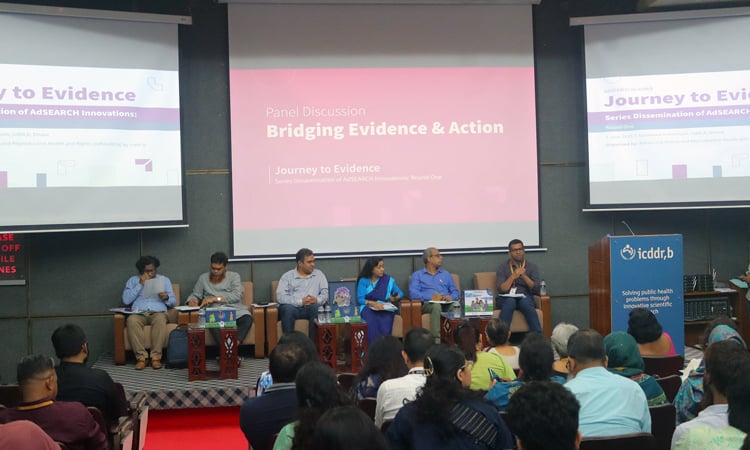
DHAKA, June1, 2025 (BSS) – International Centre for Diarrhoeal Disease Research, Bangladesh (ICDDR,B), an international public health research organization based in Bangladesh, today organised a dissemination seminar on sexual and reproductive health to raise awareness among the adolescents of Bangladesh and address their health challenges.
The seminar titled ‘Journey to Evidence: Series Dissemination of AdSEARCH Innovation – Round One’ was held today at ICDDR,b’s Sasakawa auditorium here.
The event presented findings from four research studies focused on Sexual and Reproductive Health and Rights (SRHR) for adolescents in Bangladesh.
The studies, funded by Global Affairs Canada (GAC), were conducted aiming to address the SRHR challenges faced by adolescents in the country.
One of the key findings was from the HopeBox intervention, a toolkit designed for orphaned adolescent girls. The study showed significant improvements in knowledge about menstrual hygiene and contraception.
Before the intervention, knowledge of modern contraception was between 4% and 11%. But after the program, it increased to 51%–59%,” a press release from icddr,b said suggesting expansion of the toolkit to orphanages across the country.
Syed Rubayet, Country Director of Ipas Bangladesh said sexual and reproductive health services have long remained unprioritised, especially for adolescents. “Opportunities to work in this area have been limited.
Orphaned adolescents, in particular, represent a truly neglected group. Therefore, any initiative that addresses their health needs is commendable,” he added.
President of the Obstetrical and Gynaecological Society of Bangladesh (OGSB) Professor Farhana Dewan said, “OGSB runs adolescent-friendly corners, and we are committed to reaching orphaned adolescents and bringing them under our care and services.”
Another study focused on Mukhorito, a mobile app created to educate adolescents on SRHR topics, revealed that the app led to a 16% improvement in adolescents’ knowledge.
It helped reduce social stigma and encouraged adolescents to engage in more open discussions on reproductive health and related issues with others.
In this regard, Chairperson of the Bangladesh Medical Research Council (BMRC) Professor Sayeba Akhter stressed needs for maintaining health regulations of adolescent girls.
“If we fail to address the health needs of adolescent girls, we will not have healthy mothers in the future and without healthy mothers, we cannot expect a healthy generation,” she said.
The third study, conducted with female athletes of Bangladesh Krira Shikkha Protishtan (BKSP), revealed that 86% of participants lacked adequate menstrual health education.
The study called for improved support systems, including better policies and education on menstrual health for adolescent athletes, to ensure they have the necessary resources to manage their health while training and competing.
Commenting on this, International Sports Development Consultant Professor Anupam Hossain said, “Bangladeshi girls are achieving greater success in the field of sports every day. If we can work together to remove the barriers our girls face, their journey forward will become much easier and smoother.”
The fourth study on menstrual cup usage among female workers in the Ready-Made Garment (RMG) sector reveled that menstrual cups have been a cost-effective and comfortable solution for managing menstruation, especially in workplaces where sanitation facilities are limited. The study suggested the increasing of the use of cup.
Farzana Sultana, Development Advisor at Global Affairs Canada (GAC), said, “The Canadian government is committed to advancing sexual and reproductive health and rights (SRHR) in Bangladesh.”
The seminar highlighted the need for a collaborative approach to improve adolescent health in Bangladesh.
Key officials from the Directorate General of Health Services, Directorate General of Family Planning, and other relevant institutions attended the event, which included panel discussions on future strategies for addressing these issues.